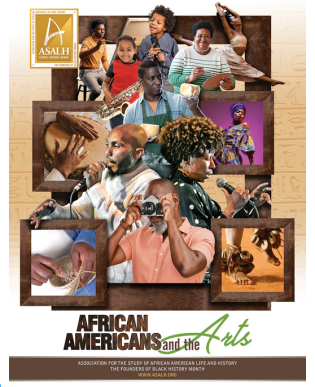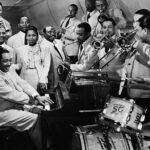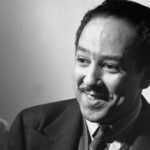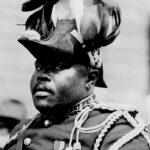BLACK HISTORY MONTH 2024
2024 | African Americans and the Arts
The theme for Black History Month 2024 focuses on “African Americans and the Arts”. This theme is infused with African, Caribbean, and Black American lived experiences. In the fields of visual and performing arts, literature, fashion, folklore, language, film, music, architecture, culinary and other forms of cultural expression the African-American influence has been paramount. African-American artists have used art to preserve history and community memory as well as for empowerment. Artistic and cultural movements such as the New Negro, Black Arts, Black Renaissance, hip-hop, and Afrofuturism, have been led by people of African descent and set the standard for popular trends around the world. In 2024, we examine the varied history and life of African-American arts and artisans.
For centuries Western intellectuals denied or minimized the contributions of people of African descent to the arts as well as history, even as their artistry in many genres was mimicked and/or stolen. However, we can still see the unbroken chain of Black art production from antiquity to the present, from Egypt across Africa, from Europe to the New World. Prior to the American Revolution, enslaved Africans of the Lowcountry began their more than three-hundred-year tradition of making sweetgrass baskets, revealing their visual artistry via craft.
The suffering of those in bondage gave birth to the spirituals, the nation’s first contribution to music. Blues musicians such as Robert Johnson, McKinley ‘Muddy Waters’ Morganfield and Riley “BB” B. King created and nurtured a style of music that became the bedrock for gospel, soul, and other still popular (and evolving) forms of music. Black contributions to literature include works by poets like Phillis Wheatley, essays, autobiographies, and novels by writers such as David Walker and Maria Stewart. Black aesthetics have also manifested themselves through sculptors like Edmonia Lewis and painters like Henry O. Tanner.
– Association for the Study of African American Life and History
Past Black History month Themes
PAST THEMES
2025: African Americans and Labor
2024: African Americans and the Arts
2023: Black Resistance
2022: Black Health and Wellness
2021: The Black Family: Representation, Identity, and Diversity
2020: African Americans and the Vote
2019: Black Migrations
2018: African Americans in Times of War
2017: The Crisis in Black Education
2016: Hallowed Grounds: Sites of African American Memories
2015: A Century of Black Life, History, and Culture
2014: Civil Rights in America
2013: At the Crossroads of Freedom and Equality: The Emancipation Proclamation and the March on Washington
2012: President Barack Obama National Black History Month Proclamation
2012: Black Women in American Culture and History
2011: African Americans and the Civil War
2010: The History of Black Economic Empowerment
2009: The Quest for Black Citizenship in the Americas
2008: Carter G. Woodson and the Origins of Multiculturalism
2007: From Slavery to Freedom: Africans in the Americas
2006: Celebrating Community: A Tribute to Black Fraternal, Social, and Civil Institutions
2005: The Niagara Movement: Black Protest Reborn, 1905-2005
2004: Before Brown, Beyond Boundaries: Commemorating the 50th Anniversary of Brown v. Board of Education
2003: The Souls of Black Folks: Centennial Reflections
2002: The Color Line Revisited: Is Racism Dead?
2001: Creating and Defining the African American Community: Family, Church Politics and Culture
2000: Heritage and Horizons: The African American Legacy and the Challenges for the 21st Century
1999: Legacy of African American Leadership for the Present and the Future
1998: Black Business
1997: African Americans and Civil Rights; a Reprisal
1996: Black Women
1995: Reflections on 1895: Douglass, Du Bois & Washington
1994: Empowering Black Americans
1993: Afro-American Scholars: Leaders, Activists and Writers
1992: African Roots Experience New Worlds, Pre-Columbus to Space Exploration
1991: Educating America: Black Universities and Colleges, Strengths and Crisis
1990: Seventy-Five Years of Scholarly Excellence: A Homage to Our Forebearers
1989: Afro Americans and Religion
1988: Constitutional Status of Afro Americans in the 21st Century
1987: Afro Americans and the Constitution from Colonial Times to the Present
1986: Afro American Experience: International Connection
1985: Afro American Family
1984: Afro Americans and Education
1983: Afro Americans in the United States
1982: Afro American Survival
1981: Black History: Role Model for Youth
1980: Heritage for America
1979: History: Torch for the future
1978: Roots, Achievements and Projections
1977: Heritage Days: The Black Perspective; the Third Century
1976: America for All Americans
1975: Fulfilling America’s Promise: Black History Month
1974: Helping America Understand
1973: Biography Illuminates the Black Experience
1972: African Art, Music, Literature; a Valuable Cultural Experience
1971: African Civilization and Culture: A Worthy Historical Background
1970: 15th Amendment and Black America in the Century (1870-1970)
1969: Changing the Afro American Image through History
1968: The Centennial of the Fourteenth Amendment Afro American History Week
1967: Negro History in the Home, School, and the Community
1966: Freedom from Racial Myths and Stereotypes Through Negro History
1965: Negro History: Freedom’s Foundation
1964: Negro History: A Basis for the New Freedom
1963: Negro History Evaluates Emancipation (1863-1963)
1962: Negro History and a New Birth of Freedom
1961: Freedom and Democracy for the Negro after 100 years (1861-1961)
1960: Strengthening America Through Education in Negro History and African Culture
1959: Negro History: A Foundation for a Proud America
1958: Negro History: A Factor in Nationalism and Internationalism
1957: Negro History
1956: Negro History in an Era of Changing Human Relations
1955: Negro History: A Contribution to America’s Intercultural Life
1954: Negro History: A Foundation for Integration
1953: Negro History and Human Relations
1952: Great Negro Educators (Teachers)
1951: Eminent Negroes in World Affairs
1950: Outstanding Moments in Negro History
1949: The Use of Spirituals in the Classroom
1948: The Whole Truth and Nothing but the Truth
1947: Democracy Possible only Through Brotherhood
1946: Let us Have Peace
1945: The Negro and Reconversion
1944: The Negro and the New Order
1943: The Negro in the Modern World
1942: The Negro in Democracy
1941: The Career of Frederick Douglass
1940: Negro Labor
1939: Special Achievements of the Race: Religion, Education, Business, Architecture, Engineering, Innovation, Pioneering
1938: Special Achievements of the Race: Oratory, Drama, Music, Painting, Sculpture, Science and Inventions
1937: American Negro History from the Time of Importation from Africa up to the Present Day
1936: African Background Outlined
1935: The Negro Achievements in Africa
1934: Contribution of the Negro in Poetry, in Painting, in Sculpture and in Science
1933: Ethiopia Meets Error in Truth
1932: What George Washington Bicentennial Commission Fail to Do
1931: Neglected Aspects of Negro History
1930: Significant Achievements of the Negro
1929: Possibility of Putting Negro History in the Curriculum
1928: Civilization: A World Achievement





